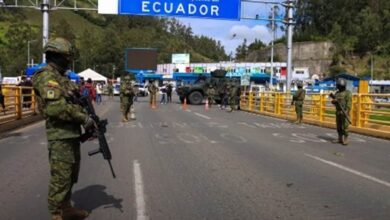Ecuador Secures $150 Million Loan to Combat Crime and Strengthen Security

The Inter-American Development Bank (IDB) has approved a $150 million loan to Ecuador to enhance its fight against crime and violence. The loan will support security initiatives, organized crime prevention, and strengthen local and regional law enforcement efforts nationwide.
A New Model for Crime Prevention
Ecuador’s ongoing battle with organized crime has reached a critical point, and the government is looking to the Inter-American Development Bank (IDB) for vital financial support. The IDB recently announced the approval of a $150 million loan to Ecuador, designed to tackle the country’s increasing levels of violence and criminal activity. Alongside the loan, Ecuador will receive a non-repayable $5 million grant from the IDB’s Special Donation Fund to help prevent crimes linked to organized crime groups and reduce the impunity of such offenses.
The loan comes with favorable terms for South American countries. With a 25-year repayment period, a 5.5-year grace period, and a floating interest rate tied to U.S. Federal Reserve publications, Ecuador will have time to implement these initiatives before needing to focus on repayments. This flexibility is essential for a nation grappling with high crime rates, economic instability, and growing social unrest.
The Program for the Prevention and Response to Violence and Crime in Ecuador (Previc) is central to the IDB’s assistance, which seeks to fortify Ecuador’s security model. The program’s goal is to not only respond to criminal activity but also to proactively prevent violence, focusing on reducing the recruitment of vulnerable populations by organized crime. As part of these efforts, the initiative will also address migrant smuggling through a national plan to regularize Ecuador’s immigrant population.
Strengthening Criminal Investigations and Prosecution
Previc’s multifaceted approach includes a significant emphasis on strengthening the capabilities of Ecuador’s criminal justice system. One of the major challenges the country faces in its fight against organized crime is the high level of impunity that surrounds many criminal activities. Despite government efforts, law enforcement agencies and judicial systems often lack the resources and specialized knowledge to successfully prosecute those involved in criminal organizations.
To combat this, the IDB’s loan will be used to enhance Ecuador’s investigative and prosecutorial capacities. Institutions such as the Financial and Economic Analysis Unit (UAFE) and the investigative divisions of the national police will be upgraded to better track and dismantle financial crimes associated with organized crime syndicates. These enhancements are expected to improve Ecuador’s ability to not only investigate crimes but also prosecute offenders effectively.
The sophisticated nature of many organized crime groups requires Ecuador to adopt modern investigative tools. This includes the use of forensic financial intelligence to follow the money trails of criminal networks. With the IDB’s financial backing, Ecuador aims to increase the capacity of its institutions to handle complex financial crimes, such as money laundering and the illegal movement of funds linked to human trafficking and drug smuggling.
Coordinating Security at All Levels
The success of this program will rely on collaboration across various levels of government and between institutions. Strengthening security and preventing crime cannot be achieved by the central government alone; it requires coordination between local authorities, law enforcement agencies, and the judiciary. The IDB’s loan will be directed toward enhancing the coordination capabilities of both the Ministry of the Interior and local governments, ensuring that crime prevention and security measures are integrated into the fabric of daily life in Ecuador.
One of the key components of this initiative is the establishment of 12 ‘Civic Centers for Life and Peace.’ These centers will serve as hubs for providing services to at-risk youth, with a strong focus on preventing recruitment into criminal gangs. By offering educational, vocational, and recreational programs, these centers aim to engage adolescents and young adults in productive activities that steer them away from crime.
Additionally, the IDB’s funding will support Ecuador in launching a comprehensive plan to combat migrant smuggling. This includes efforts to regularize the status of undocumented immigrants, many of whom are vulnerable to exploitation by criminal groups. By addressing both the causes and consequences of illegal immigration, Ecuador aims to disrupt the criminal networks that profit from human trafficking.
The program also seeks to improve Ecuador’s presence in regions that have been particularly affected by organized crime. By enhancing security infrastructure and improving local law enforcement’s ability to manage crime, Ecuador hopes to provide a safer environment for its citizens, especially in areas where government presence has been historically weak.
A Strategic Financial Partnership in Tough Times
This loan comes at a time when Ecuador’s economy is under strain. The country has been grappling with fiscal challenges, exacerbated by the sharp rise in criminal violence since 2018. Despite efforts to reignite economic growth, the surge in organized crime has added a new layer of complexity to Ecuador’s development efforts. The IDB’s financial support is crucial for Ecuador’s ability to confront these challenges head-on.
The alliance between the IDB and Ecuador, launched in August of this year, underlines the need for regional cooperation and innovative strategies to tackle organized crime. As Ilan Goldfajn, President of the IDB, explained, “The current level of sophistication of organized crime in the region requires us to implement a comprehensive and multisectoral approach.” He highlighted that the Ecuadorian program is emblematic of the IDB’s new strategy, which integrates social prevention, police intervention, criminal investigation, and security governance.
The loan will provide Ecuador with the resources needed to make meaningful changes to its security landscape, while also reinforcing the country’s long-term economic stability. By addressing the root causes of crime, particularly in vulnerable communities, Ecuador is setting the groundwork for a safer and more secure future.
In addition to providing immediate support, the IDB loan reflects a broader regional trend of increasing financial partnerships aimed at combating organized crime. With this backing, Ecuador could become a model for other Latin American countries facing similar challenges. Through its comprehensive crime prevention and security initiative, the country has an opportunity to reduce violence, improve safety, and foster an environment conducive to economic and social growth.
Ecuador’s path forward will require ongoing commitment from its leaders, institutions, and citizens. But with the support of international partners like the IDB, the country is better equipped to face the complex challenges of organized crime and security in the 21st century. As these initiatives take shape, the eyes of the region will be on Ecuador, watching to see if this innovative approach can turn the tide in the battle against crime.





